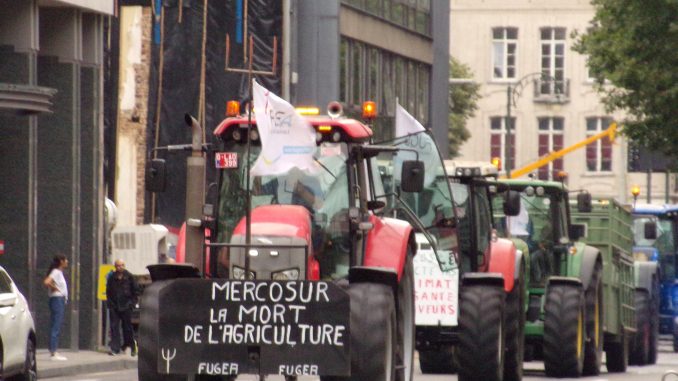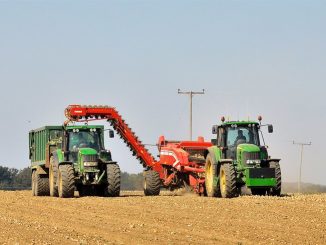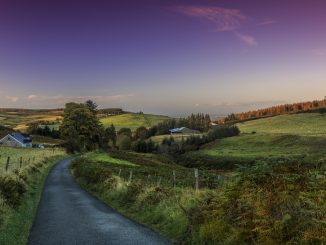
Brendán O Conchuir in Brussels (with additional contributions from Oliver Moore)
Several organisations representing farmers and environmentalists came together in Brussels to protest against the Mercosur trade deal yesterday, 11th July. Responding to a call from the Belgian farmers group FUGEA, farmers and activists gathered outside the European Commission to protest against the threat posed by Mercosur to farmer incomes, the environment, and the rights of indigenous peoples in South America.
While the primary concern of the farmer organisations is the threat posed by Mercosur to European producers, it is also clear that farmers are unhappy with the hypocrisy of the EU calling on member states to reduce agricultural emissions while preparing to import 99,000 tonnes of beef from South America.
The wide reaching implications of Mercosur beyond the financial threat to farmers was reflected in the diverse range of groups who joined FUGEA to protest against Mercosur. Several farmer organisations such as the European Milk Board, were joined by Youth for Climate, La Via Campesina, as well as several left wing and green politicians.
The deal agreed between the EU and the Mercosur countries (Argentina, Brazil, Paraguay and Uruguay), which would allow a significant increase in imports of beef, chicken and ethanol to Europe has still to be ratified by the European council, and will likely face stiff opposition in a number of member states.
Reaction in the Member States
The Irish minister for agriculture, Michael Creed, has already signalled that the Irish government is unhappy with the agreed deal, despite EU Commissioner for Agriculture, Phil Hogan, being a former government colleague of Mr. Creed.
Ireland saw an rapidly growing, more militant beef farmer movement called the Beef Plan Movement, march against government policy and against Mercosur the previous day, 10th July. (ARC2020 will report on this next week).
Leaders from France, Ireland, Belgium and Poland signed a letter of concern with regard to Mercosur last month. The French government has also expressed concerns. France has also signaled that it is unwilling to sign the agreement without reassurances from the Mercosur governments, in particular Brazil regarding environmental protection.
The Irish government has already lost a vote this week in its parliament (Dáil) on the Mercosur deal. Fianna Fáil (RE) the traditional party of smaller farmers whose support the current Fine Gael (EPP) government need to pass votes, came under enough pressure to vote with the opposition, in favour of a motion to reject the deal. This adds further pressure on the minister for agriculture who has already signalled his dissatisfaction with the deal.
Brazil and Environmental Protection
The EU has been quick to spin the environmental positives of EU-Mercosur, including on climate and the Amazon. In this quick guide it states: “The EU and Mercosur commit to effectively implement the Paris Climate Agreement and agree to cooperate on the climate aspects of trade between the two sides. The Paris Agreement includes, for example:
- A pledge by Brazil to reduce by 2025 its net greenhouse gas emissions by 37% compared to
2005 levels - Action to stop illegal deforestation including in the Brazilian Amazon.”
However facts on the ground seem to be moving Brazil far away from these Commitments. AP in May reported on a number of changes to Brazil’s environment policy since Bolsonaro took office in January. Under Bolsonaro, responsibility for indigenous territories has already been transferred from the Justice Ministry to the Agriculture Ministry, a strong signal that the area will be more exploited than at present. And this appears to be happening: rates of Amazon clearance has already rapidly increased according to the latest available figures. Climate change is a “secondary issue” according to Brazil’s environment Minister, while a major UN climate change meeting has been cancelled by the foreign ministry.
The Bigger Picture – Farmers and Trade Deals
Small farmers on both sides of the Atlantic have largely been the losers of neoliberal globalisation with large ranchers being the big winners of any deal which allows exports of south American beef to Europe. La Via Campesina, the international association of ‘peasant’ farmers organisations has consistently opposed free trade deals which threaten the sustainability of small and medium scale farmers by prioritising globalised commodity food production.
The emergence of the present neoliberal globalised model of free trade alongside subsidised agriculture has driven over production of agricultural products. This in turn has lead to the equivalent of dumping of cheaper products on markets which puts pressure on local small farmers who cannot compete with commodity scale food production.
In Europe this has contributed to a declining number of farmers and consistently low farm incomes, with some sectors impacted more than others. Despite increased agricultural output, farmers are gradually forced out of the market and the constant over supply keeps farm gate prices low. CAP direct payments encouraging this overproduction by disproportionately benefiting the largest farmers and landowners.
Meanwhile EU surplus negatively impacts on other markets, particularly in Africa, pushing down the incomes of local farmers and undermining long term sustainable development goals. The Mercosur countries meanwhile have developed intensive beef, soya, and maize production at the expense of peasants ‘campesinos’, indigenous peoples, and the rainforest. This has made Mercosur countries such as Argentina and Brazil some of the largest beef exporters in the world, while at the same time pushing small farmers and indigenous people off the land.
The environmental impact of European agriculture is rightfully being criticised and is under pressure to transition to more sustainable production methods. However there is little point in attempting to make European agriculture more sustainable while agreeing to trade deals which will see Europe importing unsustainable beef, chicken and ethanol from elsewhere.
As happened with TTIP, both farmers and environmentalists are equally interested in opposing negative trade deals. The campaign against Mercosur and other global agreements presents an opportunity for farmers and environmentalists to find common ground. In light of severe climate, biodiversity and rural needs, there is an opening to work together for a sustainable and just agriculture and trade system, and against the political and trade systems which support unsustainable agriculture.
Part 2 EU-Mercosur Trade Deal | A Road to Nowhere for Farmers?








1 Trackback / Pingback
Comments are closed.